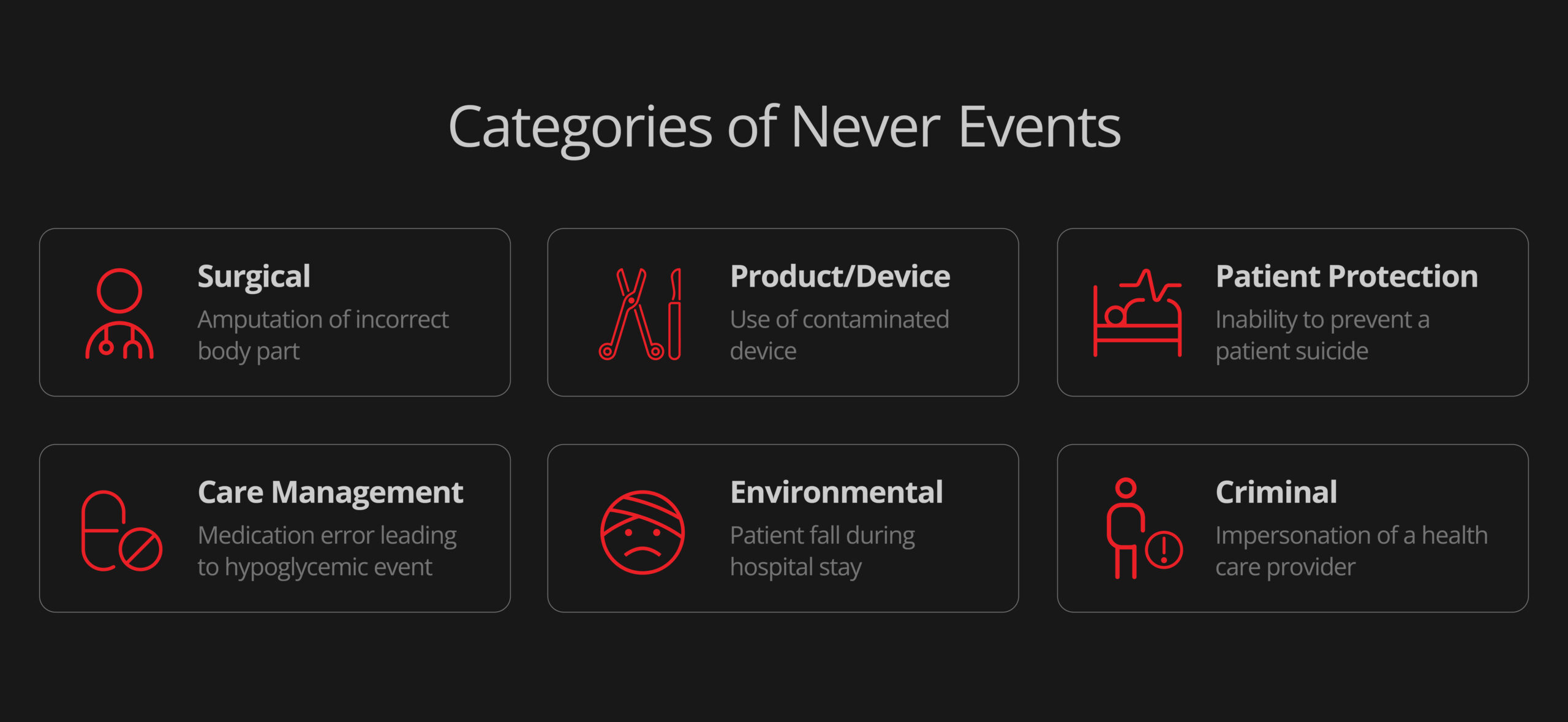6 Things You Must Know About Never Events
- Rahul Sudeep
- September 28, 2023
Medical negligence can have devastating repercussions, with never events serving as one extreme example of such negligence. Defined as preventable errors that should never take place within healthcare settings, never events continue to happen regardless of efforts undertaken to improve patient safety, placing lives in jeopardy.
As part of providing quality patient care and preventing never events, it is critical to know exactly what these incidents entail and how to prevent them. Being informed and proactive is crucial to help reduce these tragic yet preventable occurrences; here, we outline six vital facts regarding never events as well as steps taken by healthcare facilities to avoid them.
Never Events: An Overview.
Never Events (NE), as defined by the National Quality Forum (NQF), are identifiable medical errors which should never occur, which include surgical mistakes, medication mistakes, patient falls, wrong-site surgeries, and hospital-acquired infections. These events should never take place and are considered unacceptable events which indicate its failures.
Never events can have devastating repercussions for patient safety and well-being, often leaving permanent disabilities, prolonged hospital stays, increased medical costs and emotional trauma in their wake. Such incidents undermine trust between healthcare systems and patients.
Things You Must Know About Never Events
Never events are medical errors which should never occur in healthcare environments and can have catastrophic results for patients, often attributable to negligence or system malfunction. Here are six crucial things you must understand about never events:
1. Definitions for Never Events
Never events can be defined as incidents that should never occur in healthcare environments and which should never lead to harm yet are preventable. They typically manifest as easily measurable, identifiable incidents – for instance, wrong-site surgery or medication errors leading to death or serious injury due to medication errors causing patient falls causing severe injuries – leaving foreign objects inside a patient after surgery are all examples of never events that should never take place in healthcare settings.
2. Types of Never Events
Never events can be divided into several types depending on their source and nature of error. According to The National Quality Forum (NQF), 29 never events were identified that were divided among seven categories based on where the errors originated: surgical, product/device failures, patient protection failures, care management errors, environmental issues, and radiologic threats as well as criminal wrongdoings – each category representing events which should never occur in healthcare environments.

3. Impact on Patients
Never events can have devastating repercussions for patients both physically and psychologically, including prolonged pain, permanent disability or even death because of healthcare system mistakes. Psychological ramifications include trust issues in healthcare services as well as feelings of anxiety or depression among the affected parties – so it is crucial that never events are avoided to safeguard patients’ safety and well-being.
4. Causes of Never Events
Never events often arise because of human error, communication breakdowns, inadequate training or system malfunction. Errors such as these may occur at any stage in healthcare, from diagnosis through treatment to follow-up care – making it essential for healthcare providers to identify and address root causes to stop future recurrences of never events.
5. Preventing Never Events
Preventing never events requires taking an integrated approach that includes improving communication, establishing safety protocols, strengthening staff training, and creating an overall culture of safety in healthcare organizations. Establishing robust reporting and investigative systems, as well as risk mitigation plans through audits or quality improvement initiatives regularly conducted within healthcare environments can assist in this regard.
6. Legal and Ethical Considerations for Project Evaluations
Never events can have serious legal and ethical ramifications. Patients affected by them could file medical malpractice suits seeking damages; healthcare organizations could incur legal repercussions and reputational harm as a result. Healthcare professionals also have an ethical duty to provide safe care. Thus, preventing never events is central to fulfilling this responsibility.
Final Thoughts
Understanding and responding to never events are central components of providing quality patient care and avoiding medical negligence. Never events refer to preventable incidents which should never arise within healthcare settings. By understanding never events, healthcare providers can take proactive measures to avoid them and increase patient safety. Clear protocols, guidelines, and training programs must be put in place to reduce risks related to never events. Communication, reporting, and accountability are also integral in responding to never events and making necessary adjustments in healthcare systems. By prioritizing patient safety and striving for continuous improvement in care provision for their patients, healthcare professionals can work toward never-decreasing events while offering them the highest standard of service possible.

